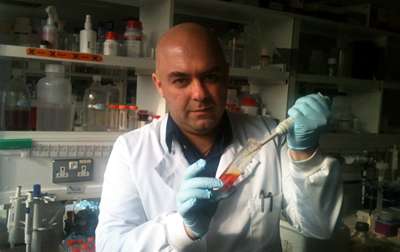(Medical Xpress)—Scientists have discovered the cause of sudden cardiac death in young children, for the first time making it possible to pinpoint a therapeutic target for future efforts in developing a cure.
Heart specialists at Cardiff found that incoherent communication between two vital proteins in heart cells was to blame for the previously inexplicable cause of death.
"A healthy and regular heartbeat is maintained by precise control of the calcium level in heart muscle cells, but our experiments have identified a genetic flaw that invites chaos to this process," said team leader of the study, Professor Tony Lai from the School of Medicine's Sir Geraint Evans Wales Heart Research Institute (WHRI).
Dr Michail Nomikos, also from the School of Medicine and the study's lead author, explained why this biological equilibrium becomes unstable: "When calcium levels rise the heart contracts and when the calcium levels drop the heart muscle relaxes, similar to the upstroke and downstroke of a motor engine. The precise control of this movement relies on the direct physical interaction between a calcium channel protein ryanodine receptor (RyR), and a calcium-sensing protein called calmodulin."
"We discovered that a genetic mutation in calmodulin causes a loss of regular heart rhythm and produces ineffective communication between calmodulin and RyR. Our findings show that there is inadequate binding between these proteins due to the mutated calmodulin gene resulting in the loss of control of cell calcium level and thereby abnormal heart function.
"Abnormal changes in calcium levels disrupt the smooth cycling between cardiac contraction and relaxation that leads to irregular heartbeat and sudden death."
In the future, Professor Lai anticipates that finding a way to intervene in ensuring a stable interaction between calmodulin and RyR in the heart will give doctors a new weapon in the fight against sudden cardiac death.
Professor Jeremy Pearson, Associate Medical Director at the British Heart Foundation, said: "Keeping the heart's calcium levels under control is critical to maintaining a healthy rhythm.
"By showing how calmodulin mutation could disrupt this and lead to sudden cardiac death, the Cardiff team have provided new clues for how to treat the condition in the future.
"Uncovering genetic links like this is vital to help combat the devastating effects of inherited heart conditions. The BHF is urgently campaigning for more research to help find the undiscovered faulty genes putting people at greater risk of heart disease."
Provided by Cardiff University





















